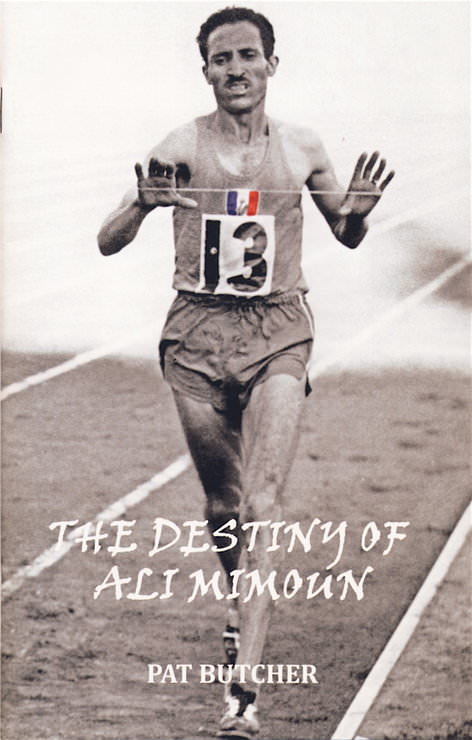BOOK REVIEW
The Destiny of Ali Mimoun by Pat Butcher
 |
Algerian-born Alain Mimoun was voted “French Athlete of the 20th Century” by the magazine Athlétisme. As a distance runner he won one gold and three silvers in the 1948, 1952 and 1956 Olympics. His name would be better known internationally today if it hadn’t been for the amazing Emil Zatopek, who three times beat Mimoun for an Olympic title. Still, Mimoun’s story is definitely worth telling. The surprise is that it has been done by an English writer.
Pat Butcher came to Mimoun’s story by chance. He interviewed the Frenchman extensively in 2001 while preparing a documentary on Zatopek. When the Zatopek project was cancelled, he nevertheless wrote up a brief biography of Mimoun. Nothing happened with this material until nine years later when Butcher decided to publish it himself. The result is a 28-page monograph of 12,000 words.
This beautifully written biography is not written the idolatry style often used in sports biographies. Rather, Butcher has taken a “perspective that is rarely attempted in a piece about a sporting hero.” This perspective has a strong historical and sociological focus. Such an approach means that the actual athletic performances are not described in detail. Though the focus is on the Mimoun himself, we learn a lot about the mid-twentieth-century culture of France and its relationship with its former colony Algeria. Butcher also spends considerable time on Mimoun’s WW2 military experience, when he almost lost a leg. Indeed the first seven pages do not touch on running at all. Rather, they tell the story of Mimoun’s early life in Algeria and his “love affair” with France.
The second part, entitled “Zatopek,” covers the bulk of Mimoun’s racing career, especially his Olympic battles with the great Czech runner. All the time, Butcher provides political and historical background, giving for example background info on the Olympic Games movement and on the development of the sport of cross-country running.
The last main part focuses on the build-up to Mimoun’s crowning achievement—his 1956 Olympic gold medal in the Marathon. Butcher provides details of the history of the marathon, of Mimoun’s second wife who was pregnant at the time of the race, of his trip to Lisieux for a miracle cure for his sciatica, and of his struggle to keep training. The actual race is made interesting by colourful quotes from Mimoun himself.
Indeed, throughout this biography Pat Butcher makes good use of the material he obtained back in 2001. Above all he captures the realities of an amateur athlete in the 1950’s France. Mimoun was very poor, living in a home without running water and working as a waiter even after his 1956 gold medal. At the same time the reader gets a good sense of the ebullient personality of Alain Mimoun.
In a moving two-page conclusion, Butcher describes Mimoun’s award of the Légion d’Honneur, France’s highest decoration, for his war service. The President of France, who gave him the decoration, made sure that finally France’s national hero would no longer live in poverty. The biography ends with an account Mimoun’s meeting with de Gaulle. “Monsieur Mimoun,” the great general said, “I have followed your career closely. I am proud of you. On behalf of France, accept our gratitude.”
Butcher is a fine writer. He captures the essence of one of the great distance runners of the 20th century. If you are interested in the history of running, The Destiny of Ali Mimoun should be on your bookshelf.
28 pp. Available through www.globerunner.org
$9.99US, including packing and postage.
Leave a Comment